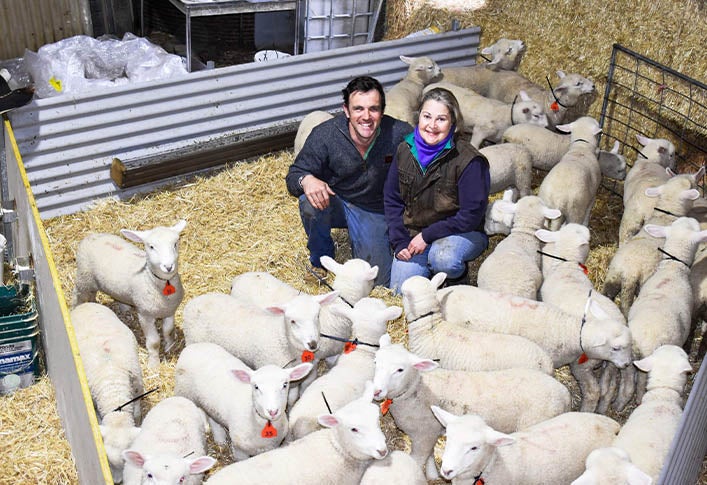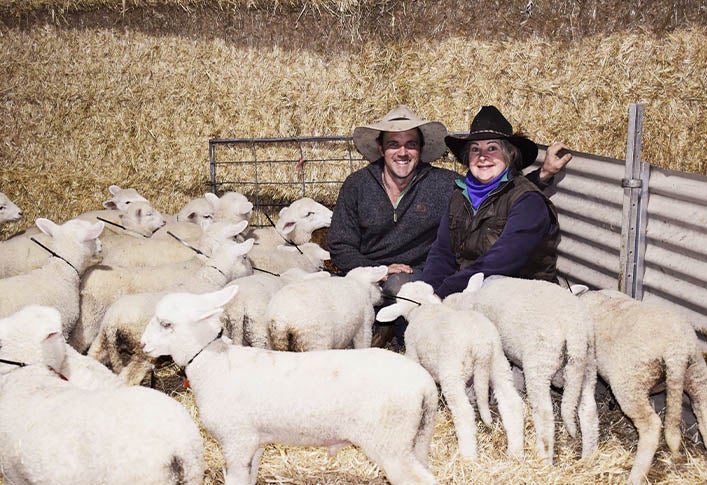Posted by on
21/09/2022
The birth of triplets has been a growing trend across Mark and Catherine Frasers’ rolling Victorian sheep operation, yet managing triplet survivability rates and ewe productivity remained a constant challenge.
However this lambing season the couple was able to retain an impressive 88 per cent of triplets born, all thanks to an innovative automated lamb feeding machine.
An investment born from some jovial banter, Mark said he joked last season when pregnancy scanning ewes that “we should put a dot on the back of those with triplets and see how many we end up with”.
“There were dots everywhere, it was out of control, and so many more than we were expecting,” he said. “We knew from past experience that if we didn’t do something our lamb survival rates wouldn’t be great.”
Widely used for calves in the dairy industry, the automated lamb feeding machine is a relatively new concept in sheep operations, and Mark said they spent months researching to ensure it was a worthwhile investment.
“We’re certainly not the first people doing it, but there aren’t too many around so we did our due diligence and spoke to a lot of people who were using them on farm, we wanted to learn as much about the machine and the process as we could to minimise mistakes.”
A season of productivity
Lambing on the Frasers’ Macarthur operation, near Hamilton, started in late July and resulted in 165 sets of triplets.
Removing one lamb from the mother helps reduce the ewe energy requirement, allowing her to raise the remaining twins.
The removed third lamb is then placed into an existing hay shed Mark has modified with bales of barley straw, where straw is also distributed for warm bedding and a cosy environment. This is also where the feeding machine is housed.
“There’s a hopper at the top of the machine that holds about 30 kilos of milk powder and it has its own hot water service. Water and milk powder are metered into a jug with a blender which mixes the powder and water,” Mark explained. “There are eight outlets with teats, so we can feed up to eight lambs at any one time and it’s all very streamlined. If lambs are drinking, the machine will continue making milk.”
The machine helped raise 165 lambs, of which, based off experience, Mark believed in excess of 50 per cent would have died in the paddock without intervention.
While he can’t fully quantify the nutritional benefits of the investment, ewes are naturally in a better condition without the strain of raising triplets, giving them a better chance of breeding well next season.
The operation also now has an extra 165 lambs which can be retained for breeding, or sold for cash flow.
An $8,000 investment, Mark is confident the figures stack up, even despite the current record high milk powder prices.
“From the numbers we’ve run so far, it’s a worthwhile investment. If we can write the machine off in the first year, then our profit per lamb will go up significantly in coming years.”
From a welfare perspective the machine is invaluable.
“As producers we have a social license to ensure we’re doing the right thing by our animals, and we very much care about their health and wellbeing.”
“The fact that this machine can help nurture lambs comfortably, relieve the nutritional burden on the mothering ewe – essentially helping support the growth of her twins – and improve lamb survivability demonstrates how versatile this machine is for production and welfare outcomes.”
Growing a modern sheep operation
Mark and Catherine purchased their block nine years ago, having previously worked on Mark’s parent’s Byaduk sheep and beef operation.
They currently run 1,700 ewes over 560 hectares, as well as an Angus beef herd, and the family has recently shifted into a maternal composite ewe flock having leased a neighbouring property.
“It’s too wet to run pure Merinos here, and we purchased the maternal composite flock when we took over the lease, so it was a logical progression.”
Mark believes a maternal composite flock simplifies their sheep operation, as it allows them to breed their own replacement ewes.
Over the past six years Mark and Catherine have noticed a vast increase in the number of twins and triplets born, a reflection on their commitment to continually improve their genetics and a considered approach to feeding and nutrition prior to joining.
First cross ewes are also given an ovulation stimulant to release more eggs, increasing the chance of twins and triplets.

A partnership to be proud of
With Mark and Catherine the farm’s full labour force, maximising efficiency across the operation to help decrease the labour component was a priority.
“The more production per man hour we can achieve, the better,” Mark said.
As such, the couple is looking at investing further into technology and innovation, and is thrilled to have Rabobank’s Hamilton Senior Rural Manager Dion Brook supporting them every step of the way.
“As a growing business we are very keen to invest further into infrastructure and technology and Dion is equally excited, and goes above and beyond to ensure we succeed,” Mark said.
“We’ve spent more time around the kitchen table with Dion over the past six months than ever before, now that we’ve leased the block next door and have a bit more scale there are some exciting conversations around our business growth, and it’s a nice feeling knowing that Dion is as equally invested in our success as we are.”
Enjoying “incredible” access to working capital, and a manager who is genuinely interested in and excited by their operation, Mark said Rabobank felt more like a business partner than a bank.
“Next on the agenda is a new sheep handler, which will continue to help take some of the hard labour out of the job, and it’s really exciting to think what Catherine and I can continue to achieve with the support of Dion and Rabobank.”
